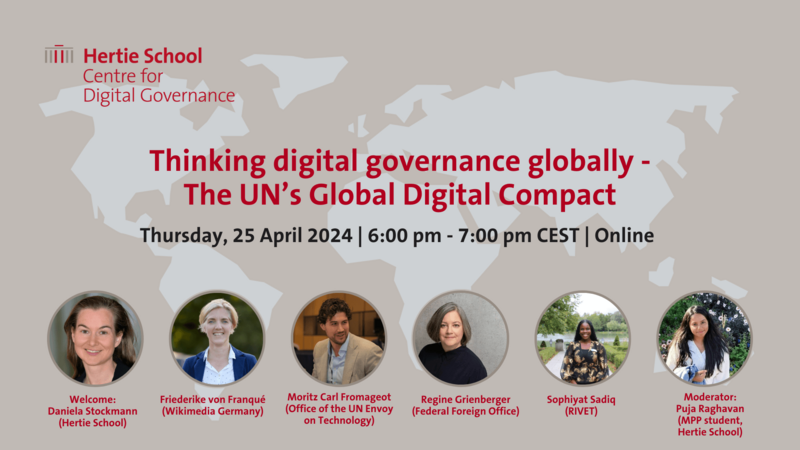
Explore the development and implementation of the Global Digital Compact (GDC) at the United Nations Summit of the Future in 2024, focusing on leveraging technology for sustainable development in alignment with the 2030 Agenda.
The United Nations Summit of the Future is scheduled for 2024. There, the adoption of the Global Digital Compact (GDC) is planned, for which consultations are led by Zambia, Sweden and the UN Tech Envoy. The role of the GDC is to promote the development and use of technology as part of the 2030 Agenda for Sustainable Development. During the panel discussion we will discover the intention and process behind the GDC including perspectives from government, civil society, and academia. The event will shed light on the intentions and strategies behind the GDC, fostering a better understanding of its role in digital governance globally.
Prof. Daniela Stockmann (Hertie School) will provide a welcome note and introduce the significance of the Global Digital Compact. This leads into a panel discussion with our distinguished panellists representing diverse perspectives from government, implementors, civil society, and academia: Dr. Friederike von Franqué (Wikimedia Germany), Moritz Carl Fromageot (Office of the UN Envoy on Technology), Dr. Regine Grienberger (Federal Foreign Office) and Sophiyat Sadiq (RIVET). After the panel discussion, the speakers will engage in a Q&A session with the audience and discuss practical steps for implementing the GDC. The event will be moderated by Puja Raghavan (MPP student, Hertie School).
This event is hosted by the Hertie School’s Student Advisory Board for the Centre for Digital Governance.
Registration is mandatory. The MS Teams link will be sent to registered guests on the day of the event.
The Hertie School will not pass your data on to third parties. The legal basis for processing your data is your given consent. You can find more information on what we do with your data as well as your rights regarding the processing of your data in our privacy policy. The Hertie School reserves the right to publish photographic, audio and film documentation of this event in print, online, and audiovisual formats. This also applies to organisations listed as partners on the event page, and event speakers. By registering for the event, you consent to appear in the documentation.
Speakers
Welcome note
Daniela Stockmann is Director of the Centre for Digital Governance and Professor of Digital Governance at the Hertie School. Her current research focuses on the interaction between government, platform firms, and citizens in the area of social media governance. She studies these interactions both in China and in Europe. Her most recent project, funded by a Starting Grant of the European Research Council, explores the impact of social media on user behaviour regarding politics in China. Stockmann has served as advisor on Chinese foreign policy and European social media governance to policy-makers in the Netherlands, Germany, and the United States.
Panellists
Dr. Friederike von Franqué works at Wikimedia Germany as an advisor for EU and international rulemaking. She has a long history of fighting disinformation and propaganda, with hands-on experience in post-Soviet republics as the founder of the Institute for Media, Democracy, and Cultural Exchange (IDEM). Her projects focus on data security, journalist protection, and reporting on violent extremism. She received her Ph.D. from the Institute for Security and Peace Research at the University of Hamburg (IFSH) on the role of media in democratic stability, peace, and conflict. In addition to giving talks on disinformation and cybersecurity, you can find her teaching media literacy and digital education at the University of Giessen, thrilled that her education as a historian is so up-to-date.
Moritz Carl Fromageot currently serves as an Associate Expert (JPO) at the Office of the UN Envoy on Technology in New York. Moritz is steering the Universal Safeguards for DPI initiative, supporting countries in harnessing the benefits of Digital Public Infrastructure (DPI) while mitigating associated risks. Additionally, he oversees the open-source strategy and work on Digital Public Goods (DPGs) and internet governance under the purview of the UN Tech Envoy. Moritz also contributes to the UN Secretary-General’s AI Advisory Body and supports the UN Tech Envoy's efforts on Data and AI Commons. Prior to this, Moritz held significant roles at GIZ’s GovStack Initiative and co-founded Aam Digital, a startup dedicated to advancing open-source solutions for international development.
Dr Regine Grienberger is the Director for Cyber Foreign and Security Policy at the Federal Foreign Office. Her previous professional experience was chiefly in the field of EU foreign policy as well as EU financial and economic policy. Dr Grienberger was Deputy Head of the Minister’s Office (Gabriel, Maas), Deputy Head of Division for European economic and financial policy, and desk officer for EU Agricultural Policy, with responsibility for crisis management in pandemics, among other areas. Her tasks also included EU public relations and the EU’s external relations with countries of the Western Balkans. She was Head of the Political Section at the German Embassy in Rome and culture, press, and protocol attaché at the German Embassy in Ljubljana.
Sophiyat Sadiq is a passionate advocate for digital inclusion, with a career dedicated to breaking down barriers and fostering opportunities in the tech realm. Her journey began with volunteer work aimed at empowering young minds, particularly girls and women, to explore the vast possibilities within technology. At present, she works at RIVET where she’s assisting its impact and youth engagement division to accelerate the youth revolution for good.
Moderator
Puja Raghavan is an Indian lawyer with a political science background who is currently working as a Young Professional on the GovStack project with the Digital Transformation team at GIZ. She has previously worked with a Berlin based GovTech startup that works in the intersection of Government and Technology. Prior to that, she practiced law on the policy and government relations team of a leading law practice in New Delhi, India before joining the Master of Public Policy cohort at the Hertie School.

